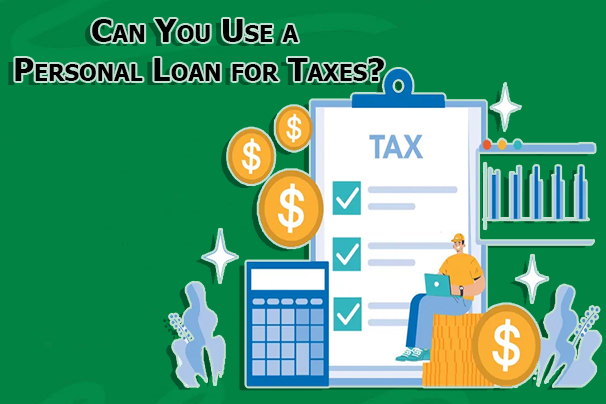Borrowers can use the money from their personal loan for anything they wish, including paying taxes, as there are very few restrictions on how it can be used. Generally, a personal loan is an unsecured amount of money obtained via an online lender, credit union, or traditional bank.

The interest rates and terms of repayment for these loans are set. Lenders’ interest rates differ, as do the borrower’s credit and financial standing. Furthermore, borrowers should think about what’s best for their budget before considering obtaining a loan for taxes.
Can You Use a Personal Loan for Taxes?
Yes, you can pay off taxes using an unsecured personal loan. However, before selecting a personal loan, you want to think about your alternative options. For instance, you may be eligible to apply for a hardship extension or an IRS payment plan. If you can afford to pay off the debt during the promotional term, you may also want to consider a credit card with 0% APR.
What to Know About Using a Personal Loan to Pay Taxes
You can pay off all or part of your outstanding taxes using an unsecured personal loan. By doing this, you may be able to avoid paying late fees and more severe repercussions for nonpayment. This includes having lower wages. However, the interest and other costs associated with using IRS programs and other repayment options are frequently greater than the cost of taking out a personal loan.
Personal loans lack collateral requirements, so lenders rely on credit history, debt-to-income ratio, and credit score for eligibility and borrowing conditions. If they can qualify at all, applicants with fair or poor credit will likely pay high interest rates on a personal loan. Furthermore, those with extremely good or excellent credit may be able to lock in a favorable interest rate.
Advantages and Disadvantages of Taking out a Personal Loan to Pay Your Taxes
If someone owes the IRS money, they are not looking forward to tax season. If you are eligible for a low interest rate, getting a personal loan to pay off your tax obligation can be a smart move. However, it also has certain disadvantages that make it unsuitable for any tax scenario.
Advantages
Allow you to pay your entire taxes
One significant benefit of a personal loan is that it gives you a lump payment to pay off your whole tax obligation all at once. By doing this, you keep the IRS from charging you further penalties and interest. Paying down your tax debt early with a personal loan also protects you against future wage garnishment or levy actions from the IRS.
Fast application and clearance procedure
When considering other forms of borrowing, qualifying conditions for personal loans are typically less complicated. In most cases, you may get approval for a personal loan in a matter of days as long as you have good credit and enough money to cover the monthly installments. You can quickly pay the IRS what you owe thanks to this quick funding.
Can assist you in avoiding using your savings
If you pay off your tax obligation with a personal loan, your other savings are not affected. If you paid taxes with money from an emergency fund or retirement account, you wouldn’t have that money available later if unanticipated costs arose. You can take care of the tax problem with a personal loan without having to make any changes to other significant bank accounts.
Disadvantages
Interest costs might mount up
The largest drawback of obtaining a personal loan to pay taxes is interest. As of January 8, 2024, the average annual percentage rate (APR) for a personal loan was 12.35%. Personal loan rates are based on several variables, including the borrower’s financial soundness, the lender’s policies, and their credit score.
It increases your overall debt load
If you have unpaid taxes, taking out a new personal loan could make your debt-to-income ratio worse. It could be harder to get approved for new credit cards, a mortgage, or an auto loan if you have more debt. A hard inquiry for a personal loan will also appear on your credit record.
There could be charges
In addition to continuous interest, personal loans may also have one-time costs. Using a personal loan to pay off your tax burden can be quite expensive due to origination, late, and prepayment costs. A low-cost loan will be necessary to offset these extra expenses.
Should You Take Out a Personal Loan to Pay Your Taxes?
Take out a personal loan to pay for this fee if you are short on funds and concerned about how you will pay your taxes this year. Moreover, examine the advantages and disadvantages of this option before deciding on it. Personal loans offer affordable, reliable financing options with fixed interest rates, but their additional costs may increase debt due to anticipated annual bills.
Final Thought
If you want to pay off your taxes, personal loans could be an excellent choice. The majority of personal loans have predictable monthly payments, don’t demand collateral, and have a quick application process. However, personal loans could have exorbitant interest rates, and if you can’t repay them, it might lower your credit score. Furthermore, ensure you fully comprehend the terms and circumstances of any loan before signing any paperwork and think about consulting a specialist.



